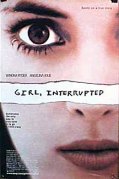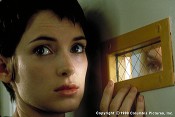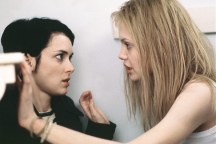| Girl, Interrupted |
| |
 |
USA/Germany, 1999. Rated
R. 127 minutes.
Cast:
Winona Ryder, Angelina Jolie, Whoopi Goldberg, Vanessa Redgrave, Clea
DuVall, Brittany Murphy, Elizabeth Moss, Jared Leto, Jeffrey Tambor, Mary
Kay Place, Travis Fine, Jillian Armenante, Kurtwood Smith
Writers: James Mangold, Lisa Loomer & Anna Hamilton Phelan
(from the memoir by Susanna Kaysen)
Music: Mychael Danna
Cinematographer: Jack N. Green
Producers: Cathy Konrad & Douglas Wick
Director: James Mangold
LINKS
|
 t's
hard to get a handle on what's wrong with Susanna (Winona Ryder), but something
certainly is. When we meet her, she's clearly in distress, walking timidly
through her world like a doe-eyed zombie, barely able to muster a facial expression,
let alone a word. Supremely uncomfortable in her comfortable upper middle-class
surroundings, she checks herself into a mental hospital shortly after a failed
suicide attempt. She merely wants a respite from life, and firmly believes
that she does not belong among the twisted human wreckage she assumes to be
in residence. Girl, Interrupted is the story of her tenure in this
refuge from the real world... that real world being a place where she cannot
seem to fit in.
t's
hard to get a handle on what's wrong with Susanna (Winona Ryder), but something
certainly is. When we meet her, she's clearly in distress, walking timidly
through her world like a doe-eyed zombie, barely able to muster a facial expression,
let alone a word. Supremely uncomfortable in her comfortable upper middle-class
surroundings, she checks herself into a mental hospital shortly after a failed
suicide attempt. She merely wants a respite from life, and firmly believes
that she does not belong among the twisted human wreckage she assumes to be
in residence. Girl, Interrupted is the story of her tenure in this
refuge from the real world... that real world being a place where she cannot
seem to fit in.
Set in the late 1960s, Mangold's film admirably eschews the standard elements
of mental hospital tales. It is not an indictment of the hospital, which
seems an inordinately pleasant and homey place, particularly in comparison to
any other ever put on film. Nor is it an indictment of mental health treatment
or caregivers. Though a point is made about the excessive degree to which
the patients are drugged, the staff and doctors are portrayed as genuinely caring
and deeply concerned with the welfare of their charges. Mangold also avoids
the Cuckoo's Nest approach of playing the sanity of its lead against
the more quantifiable disturbances of the other patients. This is not the
story of an ordinary person tossed into a den of genuine (if likable) looneys
simply because she does not conform to social standards. So what is it
the story of, exactly? To be perfectly honest, I have no idea. And therein
lies the central problem of Girl, Interrupted.
The tale of Susanna's stay at the hospital is not uninteresting, but it ultimately
boils down to a series of scenes that provide atmosphere and episodic drama
without ever settling in to make a point or develop a point of view.  We're
introduced to several young women who share her world, each of whom seems fairly
compelling on the surface. There is Daisy (Brittany Murphy), the rich girl
who steadfastly hides away from the others, presumably because she feels that
they're beneath her. There is Susanna's roommate, Georgina (Clea DuVall)
, who is a pathological liar. There is Polly (Elizabeth Moss), whose face
is severly scarred from a childhood incident with fire. There's the twig-like
girl who suffers from anorexia, and a few others whose names I never really
linked to their characters. With the marginal exception of Daisy (who figures
in one central drama), these characters are left undeveloped beyond their introductions. To
say that this is ultimately frustrating is an understatement.
We're
introduced to several young women who share her world, each of whom seems fairly
compelling on the surface. There is Daisy (Brittany Murphy), the rich girl
who steadfastly hides away from the others, presumably because she feels that
they're beneath her. There is Susanna's roommate, Georgina (Clea DuVall)
, who is a pathological liar. There is Polly (Elizabeth Moss), whose face
is severly scarred from a childhood incident with fire. There's the twig-like
girl who suffers from anorexia, and a few others whose names I never really
linked to their characters. With the marginal exception of Daisy (who figures
in one central drama), these characters are left undeveloped beyond their introductions. To
say that this is ultimately frustrating is an understatement.
The only other patient we get to know at all is Lisa (Angelina Jolie), whose
introduction establishes her as an angry, very aggressive rebel prone to escape
and recapture. The meek Susana avoids Lisa at first, but in due course
they develop a friendship that becomes the film's central focus. Lisa is a natural
born leader and provocateur, igniting conflicts and crises for fun, while also
bringing a bit of excitement and adventure into this cloistered ward. The
girls fear her, but are also drawn to her energy and her apparent courage. Susanna
gets sucked into her wake as well, and the main body of the film is a series
of episodes that depict the group dynamic that develops among the girls, with
primary emphasis on the bond between Susanna and Lisa. There are plenty of scenes
(some more engaging than others), but little resonant substance or structure
to them. By failing to develop the entire group, Mangold also fails to make
anything much of their dynamic, resulting in an oddly hollow foundation upon
which to portray Susanna's experiences.
The performances are quite good. Ryder carries herself like a wounded
bird withdrawing into the safety of isolation. Though she's the central
character, her role is primarily reactionary... perhaps akin to that of
Martin Sheen in Apocalypse Now. It is certainly her journey, but because
she's withdrawn, she's often little more than an observer along for the ride.
Ryder handles each scene with assured restraint, never getting ahead of Susanna's
internal progress.  What
results is a performance that may seem repetitious for the first 3/4 of the
film (furrowed brow, glassy and vacant stare, muted frustration), but is true
to the character as written. When she's finally pressed into emerging from
her passivity, Ryder is given a few more shades to play, all of which are nicely
rendered.
What
results is a performance that may seem repetitious for the first 3/4 of the
film (furrowed brow, glassy and vacant stare, muted frustration), but is true
to the character as written. When she's finally pressed into emerging from
her passivity, Ryder is given a few more shades to play, all of which are nicely
rendered.
Jolie has the flashier role, swinging from charismatically naughty to viciously
cruel without missing a beat. Saddled with a dreadfully ugly wig that seems
to be visual shorthand for "she's one very messed up girl," Jolie grabs center
stage in every scene she's in, embodying the callow and manipulative Lisa as
if she's on a mission. It's likely that she'll get all of the critical
attention, of course. But I found her performance disconcertingly familiar... as
if I've seen Jolie do this stuff before. She's perfect as Lisa, but I only
really connected with the performance as an actual character in the later stages
of the film. I suspect that this stems from the fact that Lisa--like everyone
else in the film--is underdeveloped. She has many characteristics, but
there's no full sense of character there until the end credits draw near.
The supporting cast is quite fine, if uniformly underused. Goldberg is quiet
and solid in a small (but important) role as the nurse who tends most directly
to the girls, a nice reminder that she is--after all--a talented actress when
given decent material. Redgrave is given only a couple of scenes, but commands
the screen effortlessly in a role that is not the least bit showy. The other
girls on the ward are also well-played, though never really given a chance to
step into the foreground and come alive as whole individuals. Among these,
Brittany Murphy fares best, bringing an achingly soulful sadness to the tragically-in-denial
Daisy. Again, she hasn't much to do, but makes the most of her screen time
with a very effective nonverbal performance. There's a terrible and pervasive
sense of doom in her eyes that manages to convey more than is actually scripted.
Mangold's visual style is mostly unremarkable, though there are some nifty
transitions staged in the early portion of the film, shifting from real time
to memory as Susanna contemplates her own state of mind and history after first
arriving at the hospital. Beyond these clever (if somewhat unfulfilling) flourishes,
the most engaging scenes in the film take place in the abandoned (and labyrinthian)
bowels of the institution, where the girls venture secretly to conduct late-night
shenanigans after disposing of their sleeping pills. Perhaps that heightened
engagement comes from the contrast of darkness against the bland lightness of
the scenes on the ward, or perhaps from the potential drama should they get
caught. I suspect, however, that these scenes come more to life because
they promise a look under the surface, not just of the institution, but of these
girls as well. The fact that they never fully deliver on that promise cuts
to the heart of what's most perplexing about Girl, Interrupted. Despite
its earnestness, it seems unrelievedly superficial.
AboutFilm.Com
The Big Picture
|
| Alison |
C
|
| Carlo |
B
|
| Dana |
B
|
| Jeff |
B
|
| Jen |
B
|
| Kris |
-
|
| ratings explained |
If there's anything substantial to be gleaned from the film's developments,
it may be the odd similarity between Susanna and Lisa, as dissimilar as they
surely are. Neither is truly mentally ill, but both are desperate for refuge
from the demands of living in the real world. Like opposite sides of the
same coin, they crave a narrow universe in which they can play out their narrow
roles with a sense of security and familiarity. The fact that their respective
roles are expressions of the same fear and desperation is brought into focus
only near the end, when it's a bit too late to derive much meaning or resonance
from the irony. I would guess that Mangold's primary intent is to emphasize
the degree to which a willingness to take responsibility for one's own fate
and to confront the world and our burdens rather than hiding from them is as
much of a "lesson" as can be learned from Susanna's experiences. There
are many peripheral issues introduced into the story, such as the possibility
that the jarringly abrupt shifts in social attitudes of the late 60s have contributed
to Susanna's sense of profound disorientation, and that her own personal values
have led her to feel misunderstood and unfairly shamed by her family and society
at large. These, however, are mere dollops of content, left mostly unexplored
beyond their introduction. When the film ended, I still couldn't get a
handle on what it was trying to say, save for the standard message of tolerance
toward those we perceive to be "different" or disturbed. It's as if Mangold's
film is flying above its own subject matter, circling and circling but never
having the audacity to land somewhere and take a closer look.
This air of thematic dissipation may have been a function of the constraints
felt by a filmmaker who knows he's telling a "true" story and fears rocking
any of the boats that are tied to it. Or perhaps he just never had a handle
on what he wanted to say in the first place. The result is truly one strange
bird of a movie. Each element succeeds on its own for the most part, but
the whole is too vague and enigmatic to lodge securely in one's consciousness. There
might have been a brilliant film to be made from this story, but that movie
is not the one on the screen. Perhaps it's buried inside of this one somewhere,
locked away in the dark labyrinth beneath the surface of what is shown. But
if that's the case, Mangold lacked either the will or the skill to ferret it
out and to drag it up into the light. What he definitely did not lack,
however, was the will or the skill to elicit good performances. On that
level, Girl, Interrupted is certainly a notable achievement for all involved.
It's a pity that the story does not ultimately serve these fine actors as well
as they serve it. As a slice-of-life look at one girl's experiences, it
has dramatic merit. As an examination of any larger themes tied to those
experiences, it sputters and comes up a bit empty. Perhaps unfairly, I
wished for more.
Review
© December 1999 by AboutFilm.Com and the author.
Images © 1999 Columbia Pictures. All Rights Reserved.

 We're
introduced to several young women who share her world, each of whom seems fairly
compelling on the surface. There is Daisy (Brittany Murphy), the rich girl
who steadfastly hides away from the others, presumably because she feels that
they're beneath her. There is Susanna's roommate, Georgina (Clea DuVall)
, who is a pathological liar. There is Polly (Elizabeth Moss), whose face
is severly scarred from a childhood incident with fire. There's the twig-like
girl who suffers from anorexia, and a few others whose names I never really
linked to their characters. With the marginal exception of Daisy (who figures
in one central drama), these characters are left undeveloped beyond their introductions. To
say that this is ultimately frustrating is an understatement.
We're
introduced to several young women who share her world, each of whom seems fairly
compelling on the surface. There is Daisy (Brittany Murphy), the rich girl
who steadfastly hides away from the others, presumably because she feels that
they're beneath her. There is Susanna's roommate, Georgina (Clea DuVall)
, who is a pathological liar. There is Polly (Elizabeth Moss), whose face
is severly scarred from a childhood incident with fire. There's the twig-like
girl who suffers from anorexia, and a few others whose names I never really
linked to their characters. With the marginal exception of Daisy (who figures
in one central drama), these characters are left undeveloped beyond their introductions. To
say that this is ultimately frustrating is an understatement.
 What
results is a performance that may seem repetitious for the first 3/4 of the
film (furrowed brow, glassy and vacant stare, muted frustration), but is true
to the character as written. When she's finally pressed into emerging from
her passivity, Ryder is given a few more shades to play, all of which are nicely
rendered.
What
results is a performance that may seem repetitious for the first 3/4 of the
film (furrowed brow, glassy and vacant stare, muted frustration), but is true
to the character as written. When she's finally pressed into emerging from
her passivity, Ryder is given a few more shades to play, all of which are nicely
rendered.
